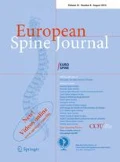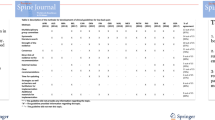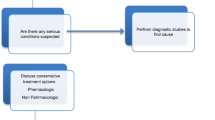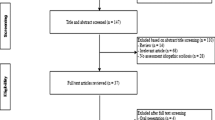Abstract
To find out whether segmental magnetic resonance imaging (MRI) findings such as intervertebral disc degeneration (DD) and facet joint osteoarthritis (FJO) are associated with motion deficiencies as seen in common mobility tests and observed range of motion (ROM). A total of 112 female subjects, nurses and office workers, with and without low back pain, were examined by clinical experts, and lumbar mobility was measured including modified Schober, fingertip-to-floor distance (FTFD) and ZEBRIS motion analysis. An MRI of the lumbar spine was made. Mobility findings were correlated with segmental morphologic changes as seen on MRI at the levels of L1-2 through L5-S1. Only a few statistically significant correlations between MRI findings and the results of the mobility tests could be found. Lateral bending was weakly and negatively correlated to DD and FJO but only on the level of L5-S1. The FTFD showed a weak positive correlation to endplate changes on the level of L4-5. When ROM is observed by clinical experts, there are several significant relationships between MRI findings and the observed motion. There is a highly significant segmental correlation between DD and disc form alteration as seen on MRI on the level of single motion segments. Pain history and current pain level did not moderate any association between MRI and mobility. There is no clear relationship between the structural changes represented by MRI and the measured mobility tests used in this study. Our findings suggest that close observation of spinal motion may provide at least equal information about the influence of spinal structures on motion than the commonly used measured mobility tests do.



Similar content being viewed by others
References
Battie MC, Bigos SJ, Sheehy H, Wortley MD (1987) Spinal flexibility and individual factors that influence it. Phys Ther 67:653–658
Bibby SR, Jones DA, Lee RB, Yu J, Urban JPG (2001) The pathophysiology of the intervertebral disc. Joint Bone Spine 68:537–542
Biering-Sorensen F (1984) Physical measurements as risk indicators for low-back trouble over a one-year period. Spine 9:106–119
Burdett RG, Brown KE, Fall MP (1986) Reliability and validity of four instruments for measuring lumbar spine and pelvic positions. Phys Ther 66:677–684
Burton AK, Tillotson KM (1991) Does leisure sports activity influence lumbar mobility or the risk of low back trouble? J Spinal Disord 4:329–336
Burton AK, Battie MC, Gibbons L, Videman T, Tillotson KM (1996) Lumbar disc degeneration and sagittal flexibility. J Spinal Disord 9:418–424
Cox ME, Asselin S, Gracovetsky SA, Richards MP, Newman NM, Karakusevic V, Zhong L, Fogel JN (2000) Relationship between functional evaluation measures and self-assessment in nonacute low back pain. Spine 25:1817–1826
DeCandido P, Reinig JW, Dwyer AJ, Thompson KJ, Ducker TB (1988) Magnetic resonance assessment of the distribution of lumbar spine disc degenerative changes. J Spinal Disord 1:9–15
Dickey JP, Pierrynowski MR, Bednar DA, Yang SX (2002) Relationship between pain and vertebral motion in chronic low-back pain subjects. Clin Biomech (Bristol, Avon) 17:345–352
Dopf CA, Mandel SS, Geiger DF, Mayer PJ (1994) Analysis of spine motion variability using a computerized goniometer compared to physical examination: a prospective clinical study. Spine 19:586–595
Ensink FB, Saur PM, Frese K, Seeger D, Hildebrandt J (1996) Lumbar range of motion: influence of time of day and individual factors on measurements. Spine 21:1339–1343
Essendrop M, Maul I, Laubli T, Riihimaki H, Schibye B (2002) Measures of low back function: a review of reproducibility studies. Clin Biomech (Bristol, Avon) 17:235–249
Ferguson SJ, Steffen T (2003) Biomechanics of the aging spine. Eur Spine J 12(Suppl 2):S97–S103
Fitzgerald GK, Wynveen KJ, Rheault W, Rothschild B (1983) Objective assessment with establishment of normal values for lumbar spinal range of motion. Phys Ther 63:1776–1781
Frost M, Stuckey S, Smalley LA, Dorman G (1982) Reliability of measuring trunk motions in centimeters. Phys Ther 62:1431–1437
Fujiwara A, Tamai K, Yamato M, An HS, Yoshida H, Saotome K, Kurikashi A (1999) The relationship between facet joint osteoarthritis and disc degeneration of the lumbar spine: an MRI study. Eur Spine J 8:396–401
Fujiwara A, Lim TH, An HS, Tanaka N, Jeon CH, Andersson GB, Haughton VM (2000a) The effect of disc degeneration and facet joint osteoarthritis on the segmental flexibility of the lumbar spine. Spine 25:3036–3044
Fujiwara A, Tamai K, An HS, Kurikashi A, Lim TH, Yoshida H, Saotome K (2000b) The relationship between disc degeneration, facet joint osteoarthritis, and stability of the degenerative lumbar spine. J Spinal Disord 13:444–450
Gauvin MG, Riddle DL, Rothstein JM (1990) Reliability of clinical measurements of forward bending using the modified fingertip-to-floor method. Phys Ther 70:443–447
Gill K, Krag MH, Johnson GB, Haugh LD, Pope MH (1988) Repeatability of four clinical methods for assessment of lumbar spinal motion. Spine 13:50–53
Hyytiainen K, Salminen JJ, Suvitie T, Wickstrom G, Pentti J (1991) Reproducibility of nine tests to measure spinal mobility and trunk muscle strength. Scand J Rehabil Med 23:3–10
Jarvik JJ, Hollingworth W, Heagerty P, Haynor DR, Deyo RA (2001) The longitudinal assessment of imaging and disability of the back (LAIDBack) study: baseline data. Spine 26:1158–1166
Kaigle AM, Wessberg P, Hansson TH (1998) Muscular and kinematic behavior of the lumbar spine during flexion-extension. J Spinal Disord 11:163–174
Laubli T, Hermens H, SjØgaard G. (2006) Neuromuscular assessment of the elderly worker, NEW: a multidisciplinary European research project. Eur J Appl Physiol 96(2):107–109
Loebl WY (1967) Measurement of spinal posture and range of spinal movement. Ann Phys Med 9:103–110
Lund T, Nydegger T, Schlenzka D, Oxland TR (2002) Three-dimensional motion patterns during active bending in patients with chronic low back pain. Spine 27:1865–1874
Macrae IF, Wright V (1969) Measurement of back movement. Ann Rheum Dis 28:584–589
McCombe PF, Fairbank JC, Cockersole BC, Pynsent PB (1989) 1989 Volvo award in clinical sciences. Reproducibility of physical signs in low-back pain. Spine 14:908–918
McGregor AH, Dore CJ, McCarthy ID, Hughes SP (1998) Are subjective clinical findings and objective clinical tests related to the motion characteristics of low back pain subjects? J Orthop Sports Phys Ther 28:370–377
Mellin G (1987) Correlations of spinal mobility with degree of chronic low back pain after correction for age and anthropometric factors. Spine 12:464–468
Merritt JL, McLean TJ, Erickson RP, Offord KP (1986) Measurement of trunk flexibility in normal subjects: reproducibility of three clinical methods. Mayo Clin Proc 61:192–197
Miller SA, Mayer T, Cox R, Gatchel RJ (1992) Reliability problems associated with the modified Schober technique for true lumbar flexion measurement. Spine 17:345–348
Mimura M, Panjabi MM, Oxland TR, Crisco JJ, Yanamoto I, Vasavada A (1994) Disc degeneration affects the multidirectional flexibility of the lumbar spine. Spine 19:1371–1380
Modic MT, Steinberg PM, Ross JS, Masaryk TJ, Carter JR (1988) Degenerative disk disease: assessment of changes in vertebral body marrow with MR imaging. Radiology 166:193–199
Moll JM, Wright V (1971) Normal range of spinal mobility. An objective clinical study. Ann Rheum Dis 30:381–386
Nachemson AL, Schultz AB, Berkson MH (1979) Mechanical properties of human lumbar spine motion segments. Influence of age, sex, disc level, and degeneration. Spine 4:1–8
Panjabi MM, Oxland TR, Yamamoto I, Crisco JJ. (1994) Mechanical behavior of the human lumbar and lumbosacral spine as shown by three-dimensional load–displacement curves. J Bone Joint Surg Am 76:413–424
Pearcy MJ, Tibrewal SB (1984) Axial rotation and lateral bending in the normal lumbar spine measured by three-dimensional radiography. Spine 9:582–587
Perret C, Poiraudeau S, Fermanian J, Colau MM, Benhamou MA, Revel M (2001) Validity, reliability, and responsiveness of the fingertip-to-floor test. Arch Phys Med Rehabil 82:1566–1570
Rannou F, Corvol M, Revel M, Poiradeau S (2001) Disk degeneration and disk herniation: the contribution of mechanical stress. Joint Bone Spine 68:543–546
Reynolds PM (1975) Measurement of spinal mobility: a comparison of three methods. Rheumatol Rehabil 14:180–185
Schenk P, Laeubli T, Hodler J, Klipstein A (2006) MRI of the lumbar spine in nurses and secretaries. Do light static and heavy dynamic work matter? Spine 31:2701–2706
Schreiber T (2001) Vergleich von 3D-Bewegungsanalysen und Röntgenfunktionsaufnahmen bei Patienten mit Verdacht auf segementale Instabilität der Lendenwirbelsäule. Phys Med Rehab Kurort 11:113–122
Strender LE, Lundin M, Nell K (1997) Interexaminer reliability in physical examination of the neck. J Manipulative Physiol Ther 20:516–520
Tanaka N, An HS, LIM TH, Fujiwara A, Jeon CH, Haughton VM (2001) The relationship between disc degeneration and flexibility of the lumbar spine. Spine J 1:47–56
Toyone T, Takahashi K, Kitahara H, Yamagata M, Murakami M, Moriya H (1994) Vertebral bone-marrow changes in degenerative lumbar disc disease. An MRI study of 74 patients with low back pain. J Bone Joint Surg Br 76:757–764
Weishaupt D, Zanetti M, Hodler J, Boos N (1998) MR imaging of the lumbar spine: prevalence of intervertebral disk extrusion and sequestration, nerve root compression, end plate abnormalities, and osteoarthritis of the facet joints in asymptomatic volunteers. Radiology 209:661–666
Yamamoto I, Panjabi MM, Crisco JJ, Thibodeau L, Yanamoto I (1989) Three-dimensional movements of the whole lumbar spine and lumbosacral joint. Spine 14:1256–1260
Acknowledgments
The authors wish to thank Prof. R. Merletti for managing the European cost shared project NEW (Neuromuscular assessment in the Elderly Worker, contract Nr. QLRT-2000-00139) as well as the Swiss State Secretariat for Education and Research for funding. Furthermore, we wish to thank Leanne Pobjoy for her help with the manuscript. The study was approved by the local ethical commission.
Author information
Authors and Affiliations
Corresponding author
Rights and permissions
About this article
Cite this article
Quack, C., Schenk, P., Laeubli, T. et al. Do MRI findings correlate with mobility tests? An explorative analysis of the test validity with regard to structure. Eur Spine J 16, 803–812 (2007). https://doi.org/10.1007/s00586-006-0264-z
Received:
Revised:
Accepted:
Published:
Issue Date:
DOI: https://doi.org/10.1007/s00586-006-0264-z




